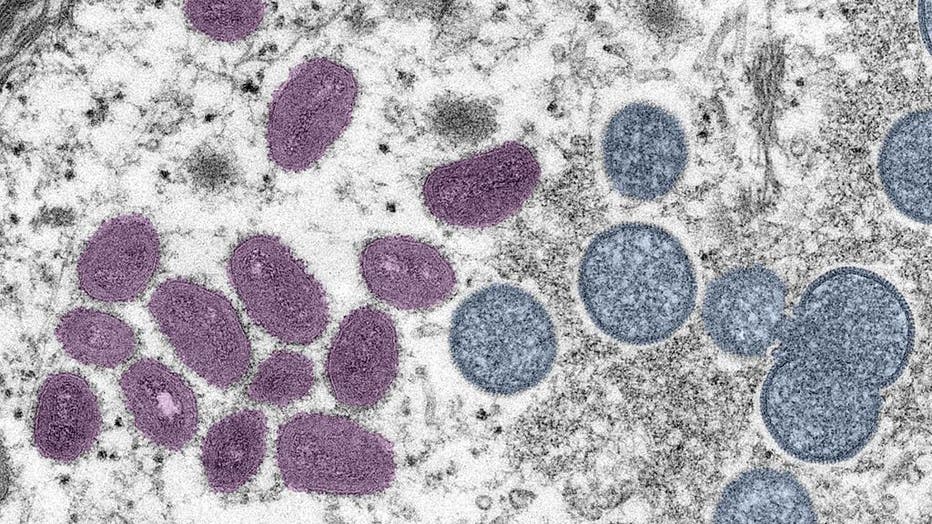DC Health expands monkeypox vaccine eligibility requirements

Infectious disease expert weighs in on monkeypox health emergency
Dr. Amira Roess from George Mason University joins Fox 5 DC to discuss the new health emergency
WASHINGTON - Health officials in D.C. announced Friday that the District's eligibility for the monkeypox vaccine is being expanded to include more people who visit the city.
According to D.C. Health, the new eligibility criteria will include District residents, individuals who work in the District, students enrolled at District universities/colleges, and persons affiliated with D.C. Health Programs that receive health care services in the District, who are 18 years or older, and meet one of the following criteria:
- All people, of any sexual orientation or gender, who have had multiple sexual partners in the past 2 weeks, including those currently considered highest risk: gay, bisexual, and other men who have sex with men, transgender men, and transgender women
- Sex workers (of any sexual orientation or gender)
- Staff (of any sexual orientation or gender) at establishments where sexual activity occurs (e.g., bathhouses, saunas, sex clubs)
READ MORE: DC Health provides weekly monkeypox vaccination clinics for eligible residents
The vaccine was previously only available for D.C. residents.
D.C. Health says the new eligibility criteria is in line with CDC’s current vaccination criteria and will go into effect on Saturday, August 13.
As of Friday, August 12, D.C. Health has:
- Received approximately 21,755 doses of the JYENNOS vaccine
- Administered more than 15,671 doses through DC Health monkeypox extended PEP clinics
- Pre-registered more than 28,700 District residents
- Sent out approximately 34,000 booking invitations (including re-invitations)
- Identified more than 700 close contacts
- Hosted pop-up vaccination clinics with community partners to ensure equitable access to vaccine
As of Saturday morning, the Centers for Disease Control and Prevention (CDC) says D.C. has reported 328 monkeypox cases.

Digitally-colorized electron microscopic (EM) image depicting a monkeypox virion (virus particle), obtained from a clinical sample associated with a 2003 prairie dog outbreak, published June 6, 2022. (Photo via Smith Collection/Gado/Getty Images)
Monkeypox Signs, Symptoms and Prevention from the CDC:
Monkeypox is a rare disease caused by infection with the monkeypox virus. Monkeypox virus is part of the same family of viruses as smallpox. Monkeypox symptoms are similar to smallpox symptoms, but milder; and monkeypox is rarely fatal. Monkeypox is not related to chickenpox.
Symptoms of monkeypox can include:
- Fever
- Headache
- Muscle aches and backache
- Swollen lymph nodes
- Chills
- Exhaustion
- A rash that can look like pimples or blisters that appears on the face, inside the mouth, and on other parts of the body, like the hands, feet, chest, genitals, or anus.
The rash goes through different stages before healing completely. The illness typically lasts 2-4 weeks. Sometimes, people get a rash first, followed by other symptoms. Others only experience a rash.
RELATED: DC launches monkeypox vaccine pre-registration system
Monkeypox spreads in different ways. The virus can spread from person-to-person through:
- Direct contact with the infectious rash, scabs, or body fluids
- Respiratory secretions during prolonged, face-to-face contact, or during intimate physical contact, such as kissing, cuddling, or sex
- Touching items (such as clothing or linens) that previously touched the infectious rash or body fluids
- Pregnant people can spread the virus to their fetus through the placenta
It’s also possible for people to get monkeypox from infected animals, either by being scratched or bitten by the animal or by preparing or eating meat or using products from an infected animal.
Monkeypox can spread from the time symptoms start until the rash has fully healed and a fresh layer of skin has formed. The illness typically lasts 2-4 weeks. People who do not have monkeypox symptoms cannot spread the virus to others. At this time, it is not known if monkeypox can spread through semen or vaginal fluids.
Prevention Steps
Take the following steps to prevent getting monkeypox:
- Avoid close, skin-to-skin contact with people who have a rash that looks like monkeypox.
- Do not touch the rash or scabs of a person with monkeypox.
- Do not kiss, hug, cuddle or have sex with someone with monkeypox.
- Do not share eating utensils or cups with a person with monkeypox.
- Do not handle or touch the bedding, towels, or clothing of a person with monkeypox.
- Wash your hands often with soap and water or use an alcohol-based hand sanitizer.
- In Central and West Africa, avoid contact with animals that can spread monkeypox virus, usually rodents and primates. Also, avoid sick or dead animals, as well as bedding or other materials they have touched.
READ MORE: Infant diagnosed with monkeypox in DC, officials say
If you are sick with monkeypox:
- Isolate at home
- If you have an active rash or other symptoms, stay in a separate room or area away from people or pets you live with, when possible.

